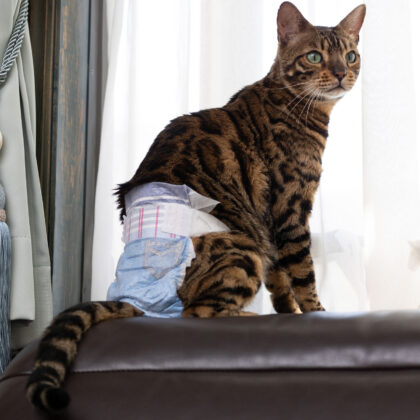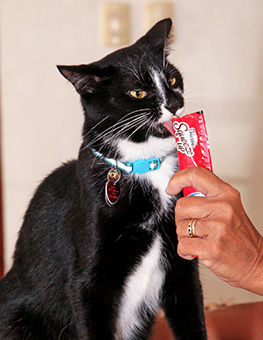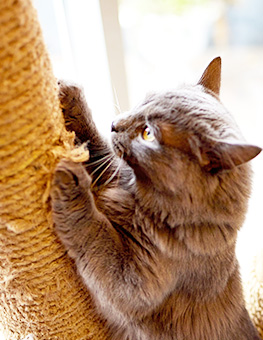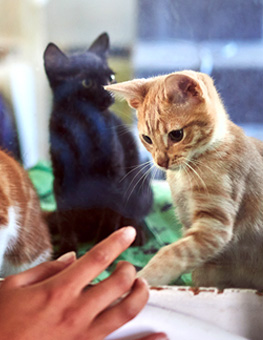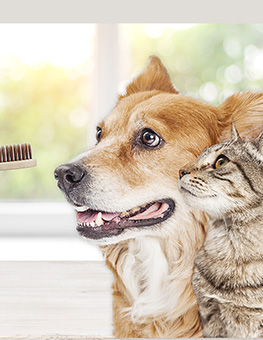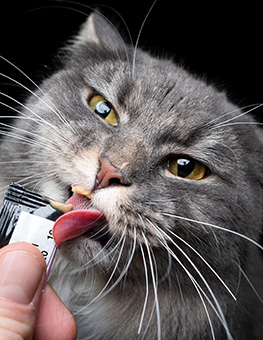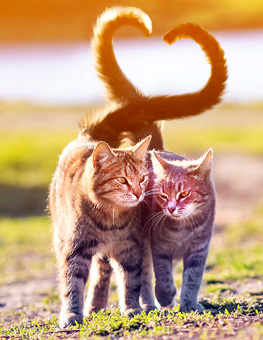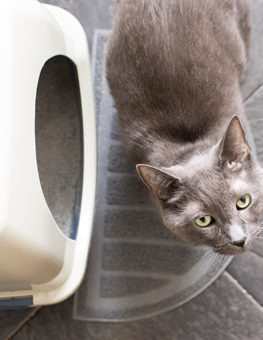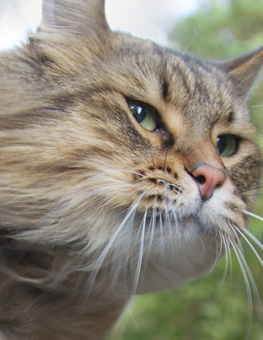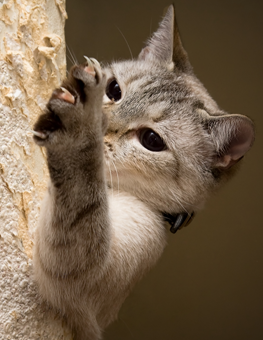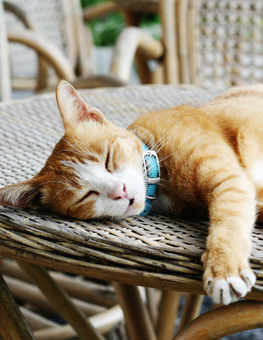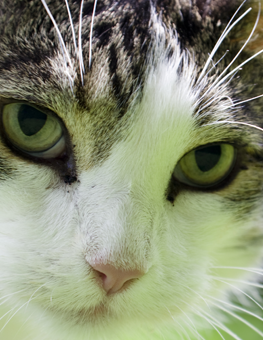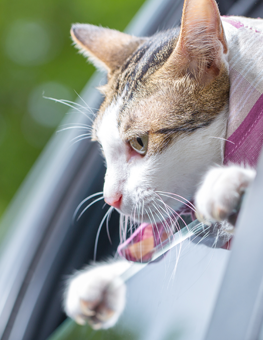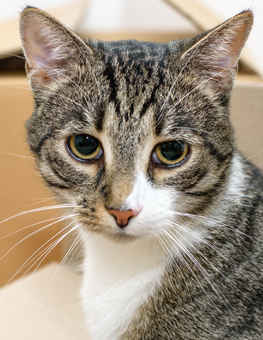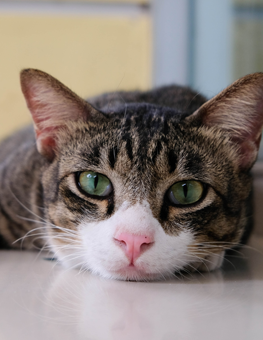How Can I Tell if My Cat Is Stressed Out?
When you’re stressed out or feeling anxious, chances are, you show it. Everyone experiences stress differently, and the same goes for your cats. What makes one cat upset or anxious may not have the same effect on another cat, and they may let you know they’re feeling stressed in different ways.

Cats can sometimes be stoic that humans may have difficulty recognizing stress in cats.
When you’re stressed out or feeling anxious, chances are, you show it. Maybe you have lower energy, or are more easily irritated. Maybe you withdraw from your friends and family, or have trouble sleeping. You may even have physical symptoms, like gastrointestinal issues or headaches. Everyone experiences stress differently, and the same goes for your cats. What makes one cat upset or anxious won’t necessarily have the same effect on another cat, and they may let you know they’re feeling stressed in different ways.
Because cats can sometimes be stoic and subtle in letting us know how they feel, humans often have difficulty recognizing and treating stress in cats. We may even have difficulty recognizing our cats’ stressors and what is causing the change in behavior. So what gets cats stressed out, anyway?
Causes of Stress in Cats
- New pet or fighting among current pets. Being forced to live with someone you either don’t know or don’t like is stressful, right? A little bit of hissing and squabbling between cats here and there is pretty normal, but there should not be constant conflict. Stress may also be caused by your cat sensing unfamiliar outdoor cats outside of his home.
- New baby. This should be self-explanatory! With a new baby comes new noises, new smells, lots of visitors, an interrupted schedule… the list goes on and on. With a little baby comes many big changes that can cause a lot of anxiety in your cat.
- Move or change in ownership. Just adopted your cat? It’s a happy time for you, but maybe not so much for him. Moving to a new home can be very scary, even when staying with the same people. Your cat’s life exists within the four walls of your home, so when you take away his familiar place and plop him down somewhere new, it can be very alarming.
- Schedule change or change in routine. Did you get a new job and now you’re working nights? Is it summertime and now the kids are staying home from school? Cats thrive on routine and like to stick to a strict daily schedule, so they really take notice when something is different about their day.
- Pain or illness. It goes without saying, but when you don’t feel good, you’re stressed. Even if your cat doesn’t seem like he has a busy lifestyle, pain and illness can disrupt his routine and leave him feeling stressed. This is especially true in cats with long-term and chronic conditions or in cats with pain or illness that goes left untreated.
- Lack of resources or overcrowding. Resources are defined as anything important to your cat: his food bowl, his favorite bed, his scratching post, even his litter box. If you have multiple cats and not enough resources to go around, that can cause stress. Cats don’t like to share their stuff, and if they have to compete for the best sleeping spot or a turn at the food bowl, they won’t be happy about it.
- Boredom. Yes, boredom is probably one of the leading causes of stress in your cat. Even senior cats need mental and physical enrichment to keep their brains and bodies working. Boredom leads to frustration, which may lead to aggression.

Hiding can indicate that your cat is stressed or ill.
Signs of Stress in Cats
- Inappropriate elimination. Your cat is probably not being intentionally difficult or spiteful when he pees on your bed. He may just be stressed. Generally, stressed cats will urinate on your things. This isn’t because he’s mad, but because you are important to him, he is seeking comfort in your scent. You’ll see stress-related inappropriate elimination happen daily or weekly, possibly after a major event, usually horizontal puddles on soft surfaces like beds, couches, or laundry. Consult your veterinarian if the inappropriate elimination persists.
- Hiding or isolation. Is your cat not coming out for his dinner? Not coming to the door to greet you when you come home like usual? Did you finally find him after hunting for a long while in the back of your closet? Any of these behaviors can indicate stress (or possible illness).
- Aggression. As you know, one of the signs of stress in humans is increased irritability. It’s no different with your cat. If you get swatted when you are trying to pet him, or if he hisses at you when you approach, your cat could be telling you, "I’m stressed! Please leave me alone!"
- Overgrooming. Excessive grooming or licking can indicate many things, one of which is stress. If you see this behavior in your cat, schedule a vet visit to rule out a medical issue first.
- Change in appetite. Again, this could be a medical issue. However, if your cat is eating or drinking more or less than usual, stress can also be indicated.
- GI/Digestive issues. Always check with your vet in case of vomiting or diarrhea, but stress can be a factor in causing these issues as well.
- ANY MAJOR CHANGE IN BEHAVIOR. Plain and simple, if your cat is acting differently than they usually do, stress is probably at play. Does your cat always sleep in the same spot on the back of the couch, but now they’re sleeping in a bed on the floor that they’ve never used before? Does your cat usually love to have his chin scratched, but now he hisses and runs away when you try? Any behavior change along these lines is worth investigating.

Issues between two cats may cause stress. Separate and slowly introduce or reintroduce them.
Addressing Stress in Your Cats
- Exercise, play, and enrichment! Cats are predators and so play that simulates hunting can be extremely rewarding and confidence-building for them. Scheduled play sessions, novel toys and items, window perches, vertical space, food puzzles, controlled outdoor access, and clicker training games, among more, can all reduce stress in your cat and make him much happier!
- Separating and reintroducing. If you’re having issues with introducing a new cat, or with existing cats that aren’t getting along, you may have to fully separate them and slowly reintroduce them to each other. Be sure to take it very slowly and build positive associations through high-value treats, petting and attention, and toys when they are together.
- Pheromones. Pheromones, available in spray, plug-in, or collar form, can reduce stress in cats. They are not a magic wand to fix all your problems, but they can certainly be useful as part of your stress-reducing routine.
- Behavioral medication. For extreme cases of stress where your cat’s quality of life is severely impacted, you may want to talk to your vet about an anti-anxiety medication.

To reduce the stress when making trips to the vet, train your cat to see the carrier as a good thing.
Reducing Stress at the Vet
One of the most stressful times for your cat is when it’s time to go to the vet. It all starts with getting them in the carrier. Then it’s time for the car ride. And then finally, your cat has to actually get through his exam. Luckily, there are many things you can do to make the trip to the vet a little easier on your cat.
- Carrier training can make a big difference in your cat’s comfort. Imagine how much easier it would be on both of you if you could train your cat to walk right in when it’s time to go! Well, it’s possible. Start by leaving out the carrier in plain sight all the time, adding treats, catnip, and comfy bedding inside to make it attractive and appealing to investigate. Once your cat starts to see the carrier as a good thing, you can introduce the cue to go inside and reward them with lots of treats!
- Car rides can be stressful for your cat as well. Ask your vet about a mild sedative prior to travel if your cat gets carsick, meows excessively in the car, or cowers in fear while in the car. You can consider playing calming music, spraying pheromones, and covering the carrier with a blanket or towel to reduce stress as well.
- Choose a vet that treats your cat kindly. Consider a cat-friendly or cat-only practice. A good vet will be gentle, patient, and calm and go at your cat’s pace.
If you’ve identified that your cat is stressed out, but are having trouble reducing stress or identifying triggers, the first step should be a visit to your veterinarian, who may be able to make recommendations for help. You may also wish to talk to a cat behavior consultant or cat trainer for advice as well. And remember to keep your own stress level down! Your cat certainly notices when you’re feeling anxious and it can rub off on him.





